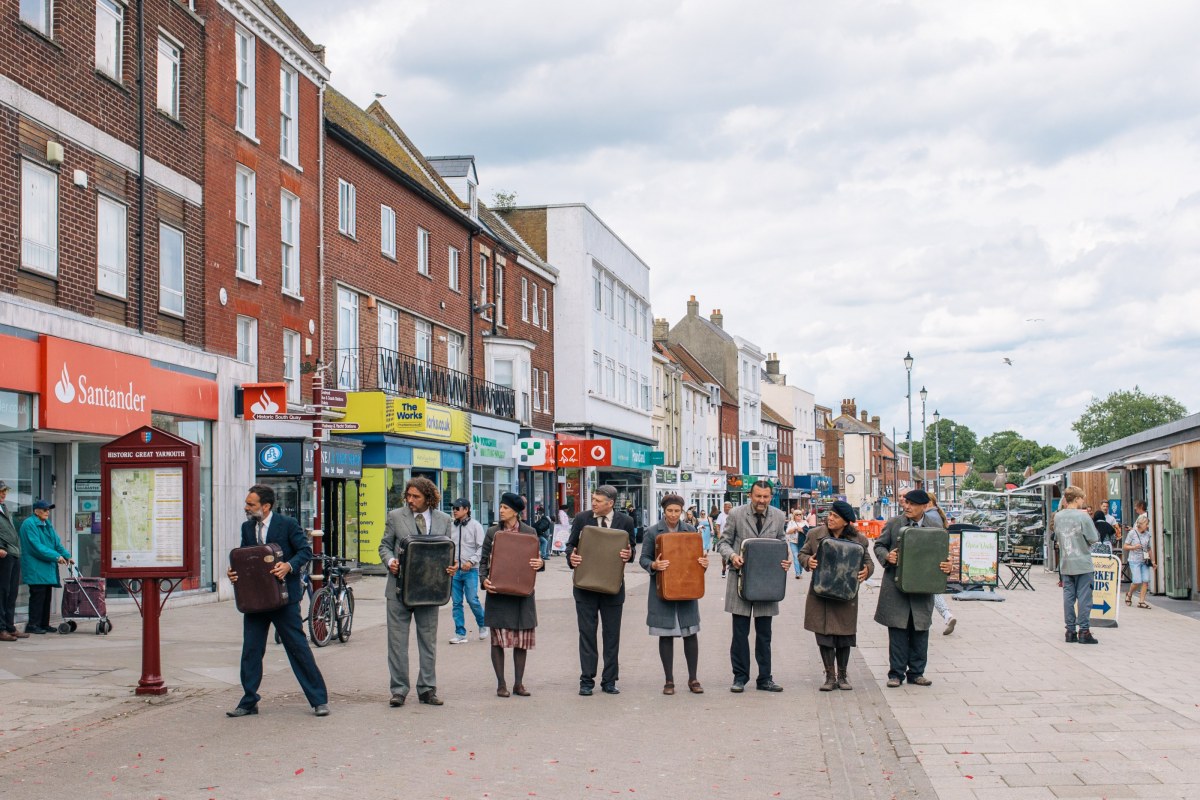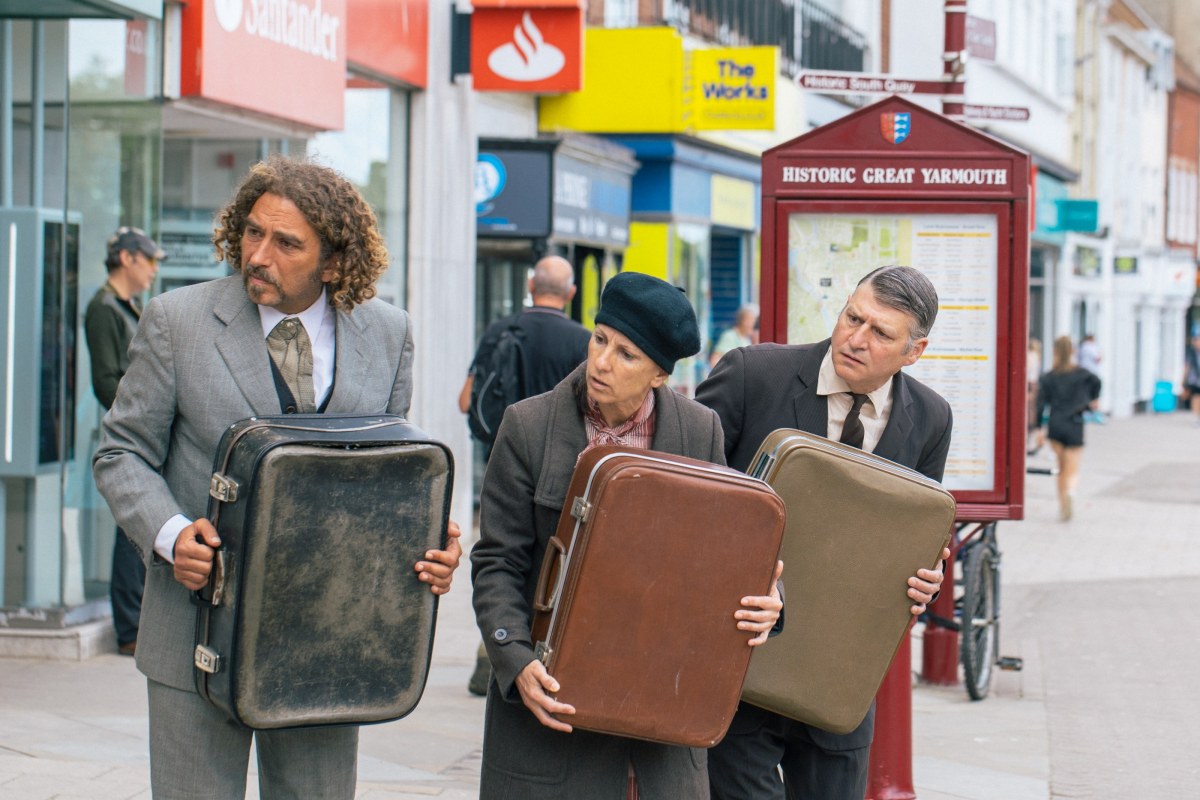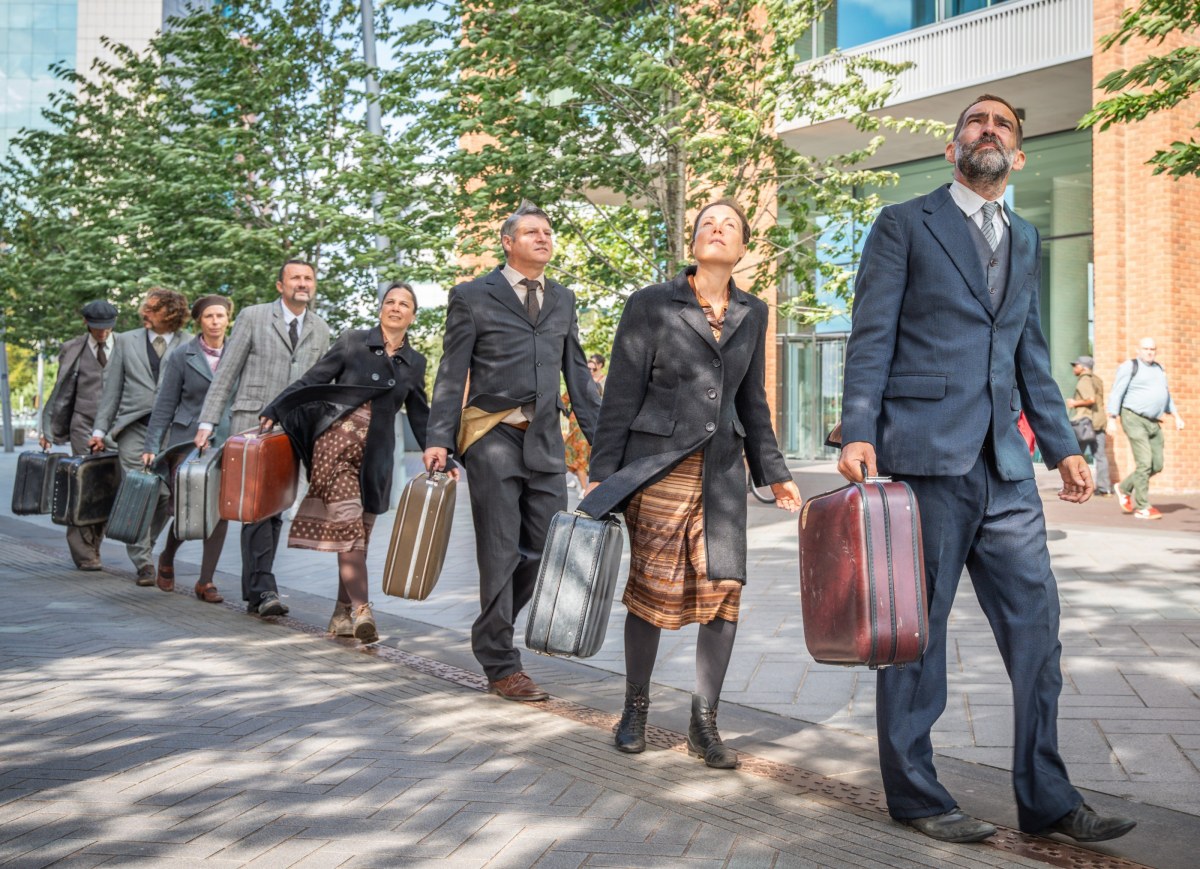

In this interview, we meet the Barcelona-based collective Kamchàtka, whose work blurs the line between fiction and reality in the public space. Since its creation in 2006, the company has developed a unique theatrical language rooted in improvisation, street performance, and human encounter. Their emblematic show, Kamchàtka, introduces us to eight mysterious characters, each carrying a suitcase, wandering through the city as if they had just arrived from elsewhere. Are they passers-by, immigrants, or simply curious explorers? Naïve, vulnerable, and disarmingly open, these figures invite us to reflect on our own attitudes toward the Other—the foreigner, the stranger, the different. This interview is part of a special series of artistic conversations published in the frame of FRESH STREET #5, the international conference for the development of outdoor arts, co-organised by Circostrada and Out There Arts, in the frame of the Out There Festival in Great Yarmouth in May 2025.

What is the Kamchàtka performance about?
Kamchàtka is about what happens to someone, a foreigner, an immigrant, when they arrive at a place they are unfamiliar with. Unfamiliar with its language, its customs, its landscape, its inhabitants; it’s about how we adapt and learn the customs of this new place, and how our ‘need’ to be accepted and feel part of a place go hand in hand with our desire to maintain our own identity and acknowledge our own culture and customs. It is a theatrical show created for outdoor space which is based on improvisation and interaction with everything and everyone, therefore it is also a show about the role public space plays in facilitating encounter, playfulness and a sense of belonging and togetherness amongst people of all ages and origins. Unlike many other ‘improv’ forms, we do not improvise just in order to entertain the audience, but rather are improvising to make sense of the ‘real world’ which surrounds both actors and audience alike (a sense which is at times endearing and at times absurd). Perhaps it is this uncertainty and sense of ‘fragility’ that are inherent to improvisation which help Kamchàtka offer a new way of looking at public space as a place where one meets and accepts ‘the other’ by highlighting humanity and empathy. Ultimately, it is about the realization that seeing ‘the other’, observing him/her, looking them in the eye, is the first step towards accepting them, and that acknowledging the existence of ‘the other’ (the immigrant, the different, the peculiar), in public space, is the easiest and most powerful gesture we can make towards making them feel welcome.
Placemaking is at the heart of Kamchàtka, how does it influence your creative direction?
The company hadn’t considered placemaking as central to its work until recently, even though it has affected our creative direction throughout the company’s existence. From the moment we took our first steps experimenting as a collective in public space (nearly 20 years ago) we quickly realised that creating a moving scene, or a movement which explores a place in a surprising way, can inject new meaning into a space and can create a place which is more open to the inherent surprises and contradictions shared spaces hold, as well as to the acceptance of ‘the other’ as part of this shared space. It is for this reason that transforming the space we perform in has always been a priority in our work: finding new ways to observe a given territory and trying to adapt to it according to its nature has played a main role in our creative development, regardless of whether the show is an improvised show or a site-specific show, which has set ‘scenes’ which we ‘customise’ to the different spaces. In both cases, our goal is to create visual and emotional souvenirs which are shared by us and the public we are with (whether they be ticket holders or passers-by) and which later can affect the way these spaces are viewed and experienced once the show is over. Seeing the audience experience within a local context and considering the emotional and spatial footprints our work leaves has been something we had considered and reflected upon for many years, but it has become more and more important and present in our work recently in view of the ‘territory-driven’ projects we have created in France and Portugal over the last couple of years, and considering our new show INCONTINUO. In that sense, INCONTINUO is highly influenced by our perception that the sense of placemaking is even further heightened when we are able to explore and underline real local history and heritage, be it through prior research (in site-specific shows and special projects) or by stumbling upon local traditions, shared memories, and emblematic places.

What does participating in a panel discussion at FRESH STREET #5 international conference for the development of outdoor arts mean to you, and how is it relevant to the Kamchàtka mission and work? Why was presenting at the 2025 edition of Out There Festival important to you?
Participating in FRESH STREET #5 has been quite significant and exciting for the company, and so has been presenting our work in this edition of Out There festival. We feel honored by the invitation to participate and feel this acknowledges, in a way, all the hard work we have done and all the outstanding partnerships we have formed over the years. FRESH and Out There festival did not only present us with the opportunity to both perform, and share insights, with like-minded professionals whom we feel we have an ongoing and in-depth dialogue with for many years, it also confirmed to us the fact that our desire to further integrate work with local collaborators and communities into our shows and projects is shared by other actors and stakeholders in the field. Working with communities brings with it the thrill of risk-taking and a sense of empowerment, but it also brings with it an exceptional responsibility towards the community and often tests one’s artistic integrity; that is why dialogue about this type of work within the outdoor and circus arts communities is essential. We were especially grateful for the opportunity to share our experience working on our project Côte-à-Côte, FRESH is definitely THE place to do that, and it was delightful to do it in such a friendly, welcoming and professional environment.

Kamchàtka is a group of artists of different nationalities and disciplines, based in Barcelona since 2006. Their work is rooted in improvisation in public space and the theme of immigration, which has been at the heart of their creations since the beginning.